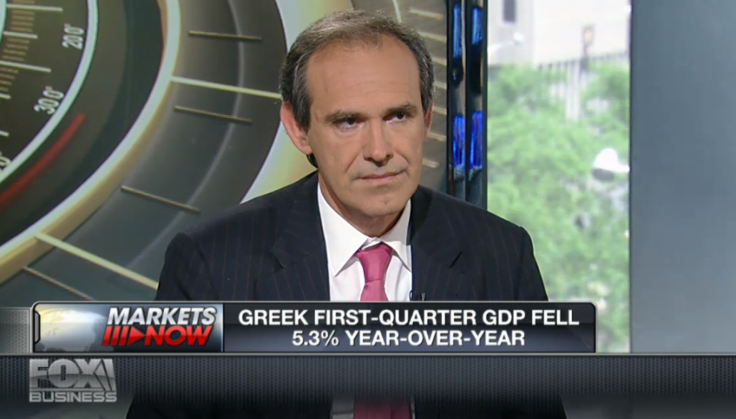Socrates Lazaridis Of The Athens Stock Exchange Promotes A Turnaround In Greece But Won't Say Why He Believes It

Socrates Lazaridis took a long drag from his cigarette. It was not his first smoke break of the day. The chairman of the Athens Stock Exchange had already been in New York City for too long, and he had to pitch Greece, a country now synonymous with economic anemia, to investors and journalists for at least a few more hours.
He was stressed.
"I hate it here," he said of New York, looking toward the sidewalk outside Manhattan's Plaza hotel, which is sandwiched between Fifth Avenue and Central Park. He wanted to return to Greece.
Earlier that day, June 4, he had appeared on Fox Business Network's "Markets Now" show, where he stumped for investors to come to Greece -- and for journalists to inject some optimism into their narrative about the country -- in his usual way: stone-faced and ambiguous.
Indeed, some of those close to Lazaridis, the man who oversees one of the most watched stock exchanges in Europe, say he is camera-shy, partly because of his nature, partly because his English isn't perfect.
But Lazaridis maintains his Vladimir Putin-esque poker face in nearly all interviews, choosing to stick to data points and widely accepted market trends.
"I do not speculate," he told International Business Times, his hands in his lap as he sat in a big leather chair near the Plaza's third-floor ballroom. "I stick to data."
He was careful even when explaining why.
Asked whether he fears any speculative sound bites he shares with reporters might make a wave in the market, he quickly leaned in: "Why do you want to know this question?"
His words have the potential to make waves. And as Greece fights to stimulate a rebound in the economy -- a concept nicknamed "Greekovery" -- things have worsened. In recent weeks, a deal to sell its state-owned natural gas company failed, setting the country back on its 1.8 billion-euro goal for privatizing state assets. Workers have been striking to protest various cuts, particularly those to the health care system. Attempts to save money by shutting down ERT, Greece's version of the BBC, were met with massive protests, and the decision was essentially overturned.
On Tuesday, the IMF, the European Central Bank and the European Commission -- collectively known as the Troika -- gave Greece 72 hours to prove it can meet the conditions of its bailout, or it would not receive its next aid payment.
But Lazaridis could not have predicted these events, and would not have.
He had made an art of dodging Fox anchor Cheryl Casone's pointed queries on the business channel.
In exchange, Lazaridis offered numbers. Foreign investment, largely from countries around Europe and the United States, made up 53 percent of market capitalization in the last fiscal year, he said. This was a good sign, he said.
"But Socrates, how do you do that when you have major groups coming out now, including the [International Monetary Fund] saying you have seven years of recession in Greece, that 2014 is still going to recession," Casone said. "How do you create those jobs, because isn't it the young unemployed that are in the streets?" she asked, referring to b-roll of young demonstrators in Athens that had played earlier in the segment.
"I cannot say how we can create those jobs," he replied. "We have to professionally provide information to investors to understand how they can invest in Greece in the globalized environment that now exists."
It's a line he has taken to parroting.
In his interview with IBTimes, Lazaridis cast aside many questions about Greece's future; if it wasn't solid or numerical, it wasn't germane to the conversation.
"In a globalized world, additional sensitivity is needed on the circulation of viable information," he had said in an earlier IBTimes report. "We are very…" he trailed off, then said, "We are speaking only with data."
Repeated attempts to contact Lazaridis at his Athens office for a follow-up interview did not receive replies.
© Copyright IBTimes 2024. All rights reserved.






















